

‘Replaceability’ isn’t as important as you might think (or we’ve suggested) When we started 80,000 Hours, one of the key ideas we presented was the replaceability argument: Suppose you become a surgeon and perform 100 life saving operations.
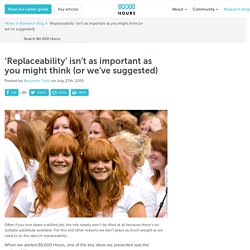
Naively it seems like your impact is to save 100 people’s lives. Sdn1513.
The Case For Putting Your Head Where Your Heart Is — Bill & Melinda Gates Foundation. Are good intentions enough to make a difference in the world?

The short answer is no. Meaningful change isn’t created by good intentions alone. No matter your passion, if you want to have a big impact, you must be armed with evidence and the resolve to make informed decisions and difficult trade-offs. I was reminded of this in William MacAskill’s thoughtful new book, Doing Good Better: Effective Altruism and How You Can Make a Difference. He provides a straightforward guide to help anyone make the largest possible difference in the lives of others.
The Logic of Effective Altruism. Photo: Adam Cohn I met Matt Wage in 2009 when he took my Practical Ethics class at Princeton University.

In the readings relating to global poverty and what we ought to be doing about it, he found an estimate of how much it costs to save the life of one of the millions of children who die each year from diseases that we can prevent or cure. This led him to calculate how many lives he could save, over his lifetime, assuming he earned an average income and donated 10 percent of it to a highly effective organization, such as one providing families with bed nets to prevent malaria, a major killer of children. He discovered that he could, with that level of donation, save about one hundred lives. He thought to himself, “Suppose you see a burning building, and you run through the flames and kick a door open, and let one hundred people out. Elon Musk To Address 'Nerd Altruists' At Google HQ. "Doing Good" Needed to Be Done a Bit Better William MacAskill is that rare creature: a true visionary and iconoclast, a bright rising star in the too often stodgy field of philanthropy.
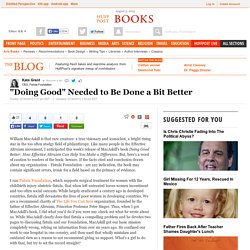
Like many people in the Effective Altruism movement, I anticipated this week's release of MacAskill's book Doing Good Better: How Effective Altruism Can Help You Make a Difference. But, here's a word of caution to readers of the book: beware. If the facts cited and conclusion drawn about my organization - Fistula Foundation - are any indication, the book may contain significant errors, ironic for a field based on the primacy of evidence. The Family with Twenty-Two Kids. When Sue Hoag was twelve, she read a book, “The Family Nobody Wanted,” about a couple in the nineteen-forties who adopted a multiracial posse of twelve children, despite having very little room or money.
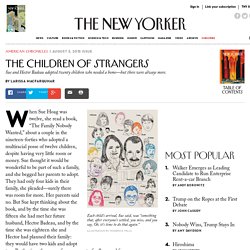
Sue thought it would be wonderful to be part of such a family, and she begged her parents to adopt. They had only four kids in their family, she pleaded—surely there was room for more. Just growing more food won't help to feed the world. The World Bank’s view that we need to grow 50% more food by 2050 to feed 9 billion people, while finding ways to reduce carbon emissions from agriculture at the same time, ignores one very simple fact – we already grow enough food for 10 billion people.
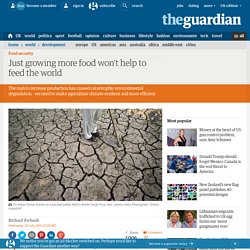
But a combination of storage losses after harvest, overconsumption and waste mean that some 800 million people in developing countries are malnourished. The storage losses mainly affect the global south: in 2011, the World Bank said: “The world seems to have forgotten the importance of post-harvest food losses in the African grain sector.” Overconsumption and waste mainly affect the global north. The challenge of feeding the world is not simply met through increases in production – this is precisely how the so-called green revolution created our current problems.
The green revolution that took place in the 1960s, increasing cereal production in developing countries, is credited with saving a billion lives. What is a 'broad intervention' and what is a 'narrow intervention'? Are we confusing ourselves? Across the community it is common to hear distinctions drawn between ‘broad’ and ‘narrow’ interventions - though less so lately than in 2014/2013.
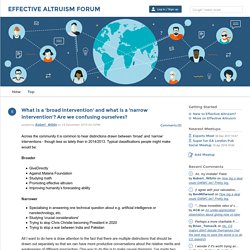
Typical classifications people might make would be: Broader GiveDirectlyAgainst Malaria FoundationStudying mathPromoting effective altruismImproving humanity’s forecasting ability Narrower. The power and efficacy of effective altruism. Engineering Mosquitoes’ Genes to Resist Malaria. Photo In a basement on the Irvine campus of the University of California, behind a series of five protective doors, two teams of biologists have created a novel breed of mosquito that they hope will help eradicate from the world.
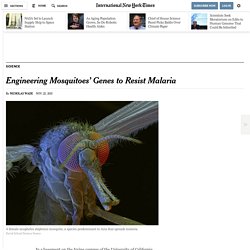
The mosquito has been engineered to carry two ingenious genetic modifications. The Price of Saving a Life ... is $3,340. The Myth of Welfare’s Corrupting Influence on the Poor. The Global Goals. A new response to effective altruism. Reid Hoffman, the founder of Linkedin, recently reviewed Will's book, Doing Good Better.
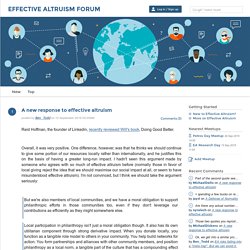
Overall, it was very positive. One difference, however, was that he thinks we should continue to give some portion of our resources locally rather than internationally, and he justifies this on the basis of having a greater long-run impact. I hadn't seen this argument made by someone who agrees with so much of effective altruism before (normally those in favor of local giving reject the idea that we should maximise our social impact at all, or seem to have misunderstood effective altruism). Travelling with purpose. How Long Will it Take Economic Growth to Eliminate Extreme Poverty?
Many charitable interventions in low-income countries have a significant positive impact, but what such interventions can achieve is frequently constrained by under-development.
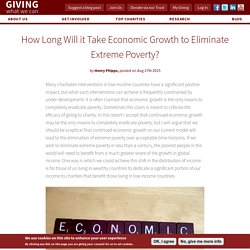
It is often claimed that economic growth is the only means to completely eradicate poverty. Sometimes this claim is meant to criticise the efficacy of giving to charity. In this report I accept that continued economic growth may be the only means to completely eradicate poverty, but I will argue that we should be sceptical that continued economic growth on our current model will lead to the elimination of extreme poverty over acceptable time-horizons. If we wish to eliminate extreme poverty in less than a century, the poorest people in the world will need to benefit from a much greater share of the growth in global income.
Diseases. Organs donation. Becoming a parent. HIPC. Introduction to EA. EA organizations. Effective Animal Altruism. Giving What We Can. 80000 hours. Poverty Action Lab. GiveWell. People. Millennium Development Goals. Critiques. Videos. EA Forum. The Economics of Morality. Picture yourself vacationing in a developing country in the hills overlooking the coast. One day during your stay, a devastating typhoon hits, leaving hundreds of people without food, water, or shelter. Fortunately for you, you’ve not been affected by the storm. You’ve got a cozy little cottage which is high on a hill and well stocked with everything you need. The destruction on the coast has made it impossible for you to travel down the hill, but you can still help by giving money to the relief effort, which is already under way.
The Most Efficient Way to Save a Life: Malaria Nets. Last winter, William MacAskill and his wife Amanda moved into a Union Square apartment that I was sharing with several friends in New York. At first, I knew nothing about Will except what I could glean from some brief encounters, like his shaggy blond hair and the approximation of a beard. He was extremely polite and devastatingly Scottish, trilling his “R”s so that in certain words, like crook or the name Brooke, the second consonant would vibrate with the clarity of a tiny engine. The quickest, funniest guide to one of the most profound issues in philosophy. This is the most persuasive case for giving more money to lifesaving charities that I've read in years. And it's written from perspective of a frat bro. Tommy Maranges, better known as Philosophy Bro, is a national treasure.
His Tumblr is full of astonishingly clear explanations of really complex ideas in philosophy, which also happen to be written as if the author spends every weekend guzzling Natty Ice in a tank top. Effective Altruism Global 2015. The High Impact Network - Home - Cool Earth. Explicit cookie consent. Mistakes I’ve made part 3: Poor sacrificial accounting. There was a time when I routinely refused car travel, in favor of my more sustainable bicycle. Not always, but I had a high bar—if it was bucketing down with rain and I had no plastic pants, this was not sufficient excuse for instance.
I would sometimes decline a ride even when others were purportedly driving somewhere anyway, to avoid encouraging them to be ‘driving anyway’ more often. I did enjoy cycling, on a good day, but many days weren’t good. People at school laughed at me on my bike, so sometimes I walked instead because I couldn’t stand them looking at me. You have $8 billion. You want to do as much good as possible. What do you do? I sat in a San Francisco conference room a few months ago as 14 staffers at the charity recommendation group GiveWell discussed the ways in which artificial intelligence — extreme, world-transforming, human-level artificial intelligence — could destroy the world.
Not just as idle chatter, mind you. They were trying to work out whether it's worthwhile to direct money — lots of it — toward preventing AI from destroying us all, money that otherwise could go to fighting poverty in sub-Saharan Africa. "Say you tell the AI to make as many paper clips as it can possibly make," Howie Lempel, a program officer at GiveWell, proposed, borrowing a thought experiment from Oxford professor Nick Bostrom. The super AI isn't necessarily going to be moral.
Even with positive goals, it could backfire. For the love of God, rich people, stop giving Ivy League colleges money. How to be Great at Doing Good. 'Peter Singer's 'Most Good' makes rational case for good life. How Effective is Fair Trade? Giving Gladly. Some General Concerns About GiveWell. The case for bragging. Effective altruism critique: Few charities stand up to rational evaluation. Conversation with Michael Bitton about EA Marketing – Everyday Utilitarian. Experience Poverty (Eurozone) How much attention does climate change warrant? - Harvard College Effective Altruism.
Here Are The Charities You Should Support, According To Data. Projects - impact.hackpad.com. Why individual donors matter: An interview with PSI’s Karl Hofmann. Charity evaluator. Raising for Effective Giving – Meta-charities. Project Effectiveness Reviews. Should You Give Away 60 Percent? - Cafe. Copenhagen Consensus Center. Social Programs That Work. RCT - Coalition for Evidence-Based Policy. The #1 reason people die early, in each country. Sustainable Development Goals. How Do We Calculate the Cost of Deworming? — Evidence Action. 2015 Gates Annual Letter. Dutch disease. Home - Aidwatch - We need your help to continue our work as an independent monitor of Australia's aid and trade.
The Giving Pledge. Distribution of wealth. World distribution of wealth. Saving with frugality. AmazonSmile: Online Shopping for Electronics, Apparel, Computers, Books, DVDs & more. Does donation matching work? What are the biggest problems in the world? - 80,000 Hours. Global Poverty Project. Global Poverty Project. Poverty. Famine, Affluence, and Morality. The Promise of Effective Altruism. The Rise of the Singerians. World Giving Index. Earning to give. Compassionate Nerds. Join Wall Street. Save the world. - The Washington Post. Students vs. Singer: Community College Students Explore Effective Altruism II.
Health Impact Fund. Cognitive dissonance. Effective Altruism Hub. Famine Affluence and Morality.pdf. Room for more funding. 30 Example Vision Statements - Top Nonprofits. Birthday Fundraisers - Charity Science. Quality-adjusted life year. The Problem With International Development—and a Plan to Fix It. Earning to give - 80,000 Hours. The Ethical Imperative of Effective Altruism.